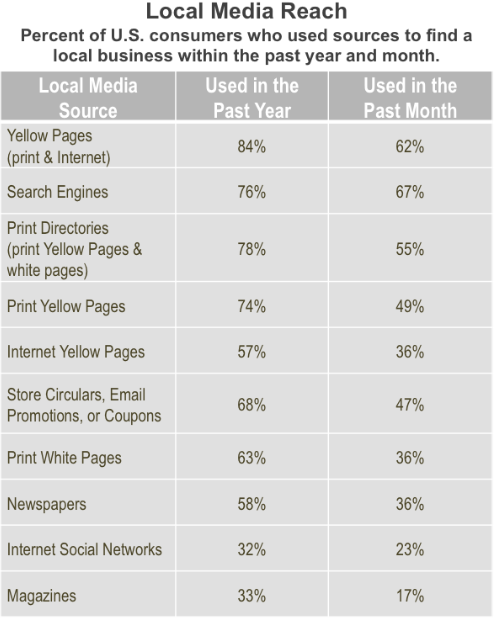How We Can Reduce the Yellow Pages
The use of Internet Yellow Pages reduces the use of printed yellow pages. In fact, with proper employee training, the business owners are assured of approximately 300% ROI for $12,000 modest investment (Amanda 2008). Switching to online Yellow Pages is a move that promotes a paperless society that is environmentally friendly.
After all, since the year 2007, print usage of the Yellow Pages stagnated at 13.4 billion according to Punjabi M. K. et al. (2008). This corresponds to a declining 87 per cent of people in the United States using the Print Yellow Pages since 2007.
Thus, the use of online Yellow Pages proves that they are cheap, convenient and environmentally friendly. In fact, not only this fact result in a paperless society because it also encourages green computing where paper and energy are conserved.
Use of opt-in and opt-out strategy advances to reduce or ban print Yellow Pages delivery. For example, in San Francisco, one is required to opt-in in order to receive the print Yellow Pages; otherwise, such deliveries are banned since passage of the ordinance. The development of an online advertising campaign to search for engines as well as the Internet Yellow Pages is significant in this endeavor.
According to the report filed in the year 2000, the use of online search engines resulted in 67 per cent including online yellow pages. On the other hand, the printed yellow pages had a response of 55 per cent as compared against the cost, convenience and user friendliness (Chiras 2009).

Ultimately, as it is suggested by Boutin (2011), 80 per cent of the directory costs are saved if yellow pages are recycled. The waste reduction initiative will cuts down on paper and yellow pages consumption by 25% compared to other newspapers covering 70 per cent.
How We Can Expand Online Books Rather Than Bookstores
The online books are more accessible and interactive than the books in printed form at the bookstores. According to English.news.cn (Guanqun 2011), about 98 per cent of internet browsers experience stress-free access to any online books. The need to increase online books is essential in correspondence to the high level of interaction as the books range from audiobooks, practice books, videos and word definitions.
One can expand the online books over bookstores through indexing services. Immense steps have been undertaken by Eat Your Books to upload over 88,000 books coupled with 2000 indexed volumes.
Online surfers just indicate in the site that books are theirs, thus, enabling them to have an access to a great variety of books. This builds a virtual bookshelf as an account for every user just like having a personal library or renting books from a bookstore.
Online books enable readers to explore through millions of copyrighted books, browse passageways and buy copies. This was confirmed when Google paid $126 million (8.5 million pounds) to build a Book Rights Registry. The Book Rights Registry enables authors and publishers to register books and get reimbursement from the sale of books.
Again, one can set up the user account to receive email access on new online books opposed to getting to the bookstore. The discounts offered in online books (30 or 40% off) make them cheaper than in any bookstore, which offers lower discounts at 20 % off (Guanqun 2011).
References
Amanda, B., 2008. How to reduce your carbon footprint. New York: Crabtree Publishing Company.
Boutin J. P., 2011. Yellow Pages Going Green. Life in Yellow A blog by Yellow Pages Group, [blog] September 1. Web.
Chiras, D. D., 2009. Environmental Science. Burlington: Jones & Bartlett Learning.
Guanqun W., 2011. Traditional bookstores fight for survival as online book sales boom. English.news.cn, Web.
Punjabi, M. K., Anderson T., Katz M., McMillan L, & Petri G., 2008. New Research Shows Overall Yellow Pages Usage Growing — 17.2 Billion Searches in 2007
Yellow Pages. Web.